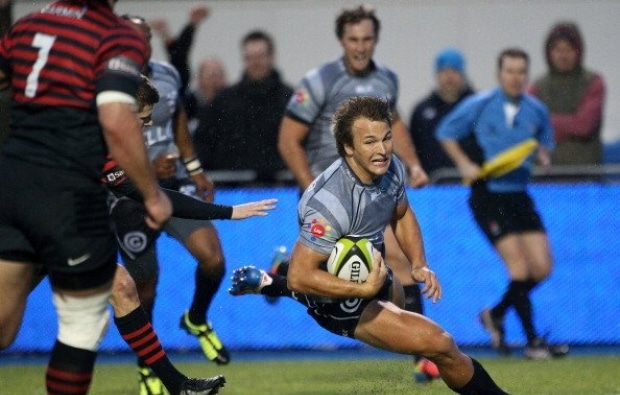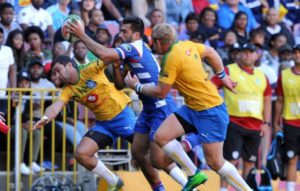South Africa’s best rugby teams cannot leave Sanzaar and join the elite tournaments in the northern hemisphere soon enough, writes JON CARDINELLI.
Munster against the Lions at Thomond Park. Saracens against the Sharks at Allianz Stadium. Clermont Auvergne against the Bulls at Stade Marcel-Michelin. Toulon against the Stormers at Stade Mayol.
These are the north-versus-south club clashes that rugby fans have been dreaming about since the dawn of the professional era.
It’s always been a matter of when, rather than if, South African rugby would swap Super Rugby and the Rugby Championship for the elite tournaments of the northern hemisphere. And if recent developments are to be taken as a sign of things to come, we should expect South Africa’s best to join an expanded Pro12 competition, and possibly the European Cup, as soon as 2020.
SA Rugby CEO Jurie Roux inferred as much at a press conference on Friday. Roux spoke about the Cheetahs and Kings’ exit from the Super Rugby tournament as a positive. He talked about a likely debut in a northern hemisphere competition as if it were significant step forward for South African rugby as a whole.
ALSO READ: Axed teams could play two tournaments
Roux used the phrase ‘proof of concept’ several times. SA Rugby has been contemplating a move to the north for ages. If all goes well for the Cheetahs and Kings in the coming months, we could see the Bulls, Lions, Sharks and Stormers joining the European party in the near future.
The positives of such a drastic change far outweigh the negatives. For starters, the Sanzaar ship has been sinking for some time. Best that SA Rugby jumps ship sooner rather than later.
The addition of yet more teams from South Africa and Australia, as well as the introduction of Argentinean and Japanese franchises have affected the scheduling and ultimately the integrity of the Super Rugby tournament. TV viewer and stadium attendance numbers have dipped significantly in recent years.
Yet, some are still fighting for the inclusion of the Sunwolves and all five Australian franchises, and ultimately a competition that features at least 18 teams. The Force and Rebels are in denial if they believe that their ongoing participation benefits the tournament, or Australian rugby for that matter.
Super Rugby used to be the elite regional competition. Those were the days – the era between 1996 and 2005, to be exact – of strength versus strength, when the best 12 sides from Australia, New Zealand and South Africa battled it out for the most coveted trophy in club rugby.
The travel factor has always threatened the integrity of the tournament since its inception, though. In 22 years, no South African team has won a final in Australasia. The Chiefs lost in New Zealand’s one and only final appearance in South Africa (2009).
Now, imagine a South African team competing in a Pro12 or European Cup final. The time difference between South Africa and Europe is negligible, and so players won’t need days to recover from jet lag in the lead-up to big games.
We may just get to see a fair contest. What a novel idea.
Later this year, we will see the Cheetahs and Kings competing in northern climes. Those teams may not progress as far as a final, but their very participation in a northern hemisphere competition will set a precedent.
Of course, the obvious question is why SA Rugby insists on retaining six elite franchises when the country only has the resources for four. The Bulls, Lions, Sharks and Stormers would be stronger if the best Cheetahs and Kings players joined their ranks. Several players have already confirmed that they will represent a different franchise in the 2018 Super Rugby tournament, rather than one of the Cheetahs or Kings in a northern hemisphere competition.
It’s yet to be clarified exactly how the Cheetahs and Kings will be accommodated in Europe. They appear destined to feature in an expanded Pro14 tournament, but will they have the opportunity to qualify for the European Cup?
This is an important question. The Pro12, as it stands, is not the elite tournament in Europe. The Bulls, Lions, Sharks and Stormers should follow the Cheetahs and Kings north, with the aim of featuring in the top competition, which at this stage is the European Cup.
The Pro12 could grow in the coming years, adding South African sides and possibly even an American outfit to complement its existing Irish, Welsh, Scottish and Italian contingent. And yet it’s hard to see how that competition could rival the European Cup for personnel and playing standards.
The French clubs boast more money and tend to attract the best players from around the world. The English Premiership is the strongest domestic tournament in world rugby and also features some of the best international players.
In short, there’s no point in South Africa’s best teams heading north if they don’t intend to be part of a European Cup tournament that includes the strongest sides that England and France have to offer.
Another challenge is the length of the season. There’s been some concern over the overlapping of the Pro12 and the Currie Cup. This shouldn’t be a primary concern. The Currie Cup is not the tournament it once was. At this point, it can be compared to the Vodacom Cup of old, that is, a vehicle for developing young talent.
The management of players over the course of a European season that runs from early September to late May could be problematic. The best players from the Cheetahs and Kings can look forward to Springbok selection in the June Tests and in the subsequent Rugby Championship, which commences in mid-August. That doesn’t leave much opportunity for rest.
One gets the feeling that this is where rugby is going, though. The June Test window may eventually fall away. The southern hemisphere may eventually follow the north in terms of its scheduling. The global season may become a reality, with elite teams competing in premier club competitions from September to May.
At the end of the day, isn’t that what we all want, to see the best club teams in the world facing off week after week? Asking the public to stomach another two seasons of Super Rugby that offers a schedule jam-packed with one-sided and ultimately meaningless fixtures is bad enough.
Photo: Charlie Crowhurst/Getty Images





